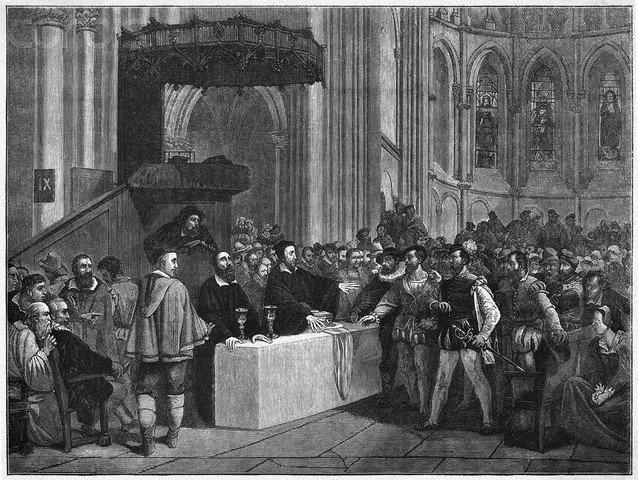
John Calvin’s interpretation of the Bible justified the murder of his theological opponents. He himself did not cut off any heads or light any fires that burned human heretics alive, but John Calvin’s preaching from the Old and New Testaments claimed those capital punishments aligned with God’s interests.
 How so? Calvin did not believe all Old Covenant laws had been set aside by the New Covenant Jesus inaugurated. He didn't buy into the plain sense of Hebrews: “God has made the first covenant obsolete” (Hebrews 8:13). He maneuvered around Paul’s conclusion: “the Law became a tutor to lead us to Christ and now that faith has come we are no longer under a tutor” (Galatians 3:24-25; cf. Rom 10:4). Calvin dismissed this data from the New Testament and decided the moral laws in the Old Covenant laws of the Torah still applied. And killing people who perverted his pure doctrine was a moral necessity.
How so? Calvin did not believe all Old Covenant laws had been set aside by the New Covenant Jesus inaugurated. He didn't buy into the plain sense of Hebrews: “God has made the first covenant obsolete” (Hebrews 8:13). He maneuvered around Paul’s conclusion: “the Law became a tutor to lead us to Christ and now that faith has come we are no longer under a tutor” (Galatians 3:24-25; cf. Rom 10:4). Calvin dismissed this data from the New Testament and decided the moral laws in the Old Covenant laws of the Torah still applied. And killing people who perverted his pure doctrine was a moral necessity.
Calvin specifically justified capital punishment of heretics with Leviticus 24:16. “The one who blasphemes the name of the Lord should be put to death; all the congregation must stone him. Any foreigner or native who blasphemes the Name should be put to death.”
Jesus’ teaching to “love your enemies” didn’t stop Calvin from approving and promoting the death of his theological enemies. And Paul’s instructions for dealing with people who theologically disagree with you were equally ignored: “A servant of the Lord must not quarrel but must be kind to everyone, be able to teach, and be patient with difficult people. Gently instruct those who oppose the truth. Perhaps God will change those people’s hearts, and they will learn the truth” (2 Timothy 2:24-25). Calvin did not patiently discuss his differences with people who promoted competing ideas. Calvin requested beheadings, made death threats, and praised God for orchestrating the torture of heretics.
Calvin spelled out his theologically reinforced vengeance in a personal letter:
“I am persuaded that it is not without the special will of God that, apart from any verdict of the judges, the criminals have endured protracted torment at the hands of the executioner.” - Calvin's letter to Farel on 24 July (for more words directly from Calvin’s pen, read Selected Works of John Calvin)
Calvin believed God made sure criminals didn’t die quickly when tortured. This vengeful attitude and his support for outdated Old Covenant laws that legislated capital punishment for competing theologians that challenged his preferred doctrines looked more like ISIS than Jesus.
 Personal correspondence and city council records betray John Calvin’s extraordinary influence in Geneva. Although he was asked to leave in 1538 when he enforced his strict moral standards and pushed for the church’s independent power to excommunicate people, Genevan officials invited him to return in 1541 to resolve church divisions. Upon his return, the city council approved his Ecclesiastical Ordinances that included the establishment of the Consistory. The Consistory, a church court that oversaw the discipline of the citizens of Geneva, met every Thursday to review cases (This book is a chronicle of the Consistory’s records from 1542-1544.) John Calvin led the court. Although the Consistory did not have the power to imprison, exile, or kill those who were guilty, Calvin could still convince the city magistrates to wield such power when his theological opponents contradicted him.
Personal correspondence and city council records betray John Calvin’s extraordinary influence in Geneva. Although he was asked to leave in 1538 when he enforced his strict moral standards and pushed for the church’s independent power to excommunicate people, Genevan officials invited him to return in 1541 to resolve church divisions. Upon his return, the city council approved his Ecclesiastical Ordinances that included the establishment of the Consistory. The Consistory, a church court that oversaw the discipline of the citizens of Geneva, met every Thursday to review cases (This book is a chronicle of the Consistory’s records from 1542-1544.) John Calvin led the court. Although the Consistory did not have the power to imprison, exile, or kill those who were guilty, Calvin could still convince the city magistrates to wield such power when his theological opponents contradicted him.
When Jacques Gruet, a theologian with differing views, placed a letter in Calvin’s pulpit calling him a hypocrite, he was arrested, tortured for a month and beheaded on July 26, 1547. Gruet's own theological book was later found and burned along with his house while his wife was thrown out into the street to watch.
Michael Servetus, a Spaniard, physician, scientist and Bible scholar, suffered a worse fate. He was Calvin's longtime acquaintance who resisted the authority of the Roman Catholic Church. However, he angered Calvin by returning a copy of Calvin's Institutes with critical comments in the margins. So what did Calvin do? You can read his resolution from a personal letter he wrote to a friend:
“Servetus offers to come hither, if it be agreeable to me. But I am unwilling to pledge my word for his safety, for if he shall come, I shall never permit him to depart alive, provided my authority be of any avail.” - Letter to Farel, 13 February 1546
The next time Servetus attended Calvin's Sunday preaching service on a visit, Calvin had him arrested and charged with heresy. The 38 official charges included rejection of the Trinity and infant baptism. The city magistrates condemned him to death. Calvin pleaded for Servetus to be beheaded instead of the more brutal method of burning at the stake, but to no avail. Some people see Calvin’s compassion in pursuing a more humane method of death, but ultimately he supported killing Servetus and all such heretics.
On October 27, 1553, green wood was used for the fire so Servetus would be slowly baked alive from the feet upward. For 30 minutes he screamed for mercy and prayed to Jesus as the fire worked its way up his body to burn the theology book strapped to his chest as a symbol of his heresy. Calvin summarized the execution this way:
Disagreeing with Calvin’s view of God was a violation warranting the death penalty according to the way John Calvin interpreted Leviticus 24:16.
|
“Servetus . . . suffered the penalty due to his heresies, but was it by my will? Certainly his arrogance destroyed him not less than his impiety. And what crime was it of mine if our Council, at my exhortation, indeed, but in conformity with the opinion of several Churches, took vengeance on his execrable blasphemies?”
How could such torture be condoned? In November 1552 the Geneva Council declared Calvin's Institutes of the Christian Religion to be a "holy doctrine which no man might speak against." Disagreeing with Calvin’s view of God was a violation warranting the death penalty according to the way John Calvin interpreted Leviticus 24:16. The Geneva city council records describe one verdict where a man who publicly protested against John Calvin’s doctrine of predestination was flogged at all the city’s main intersections and then expelled (“The Minutes Book of the Geneva City Council, 1541-59,” translated by Stefan Zweig, Erasmus: The Right to Heresy). You did not get to disagree with Calvin in this town.
John Calvin argued: “Whoever shall now contend that it is unjust to put heretics and blasphemers to death, knowingly and willingly incur their guilt. It is not human authority that speaks, it is God who speaks and prescribes a perpetual rule for His Church.”
Most bad Bible interpretation causes disappointment in an unbiblical god, anxiety about what he demands, or a false sense of security rooted in biased beliefs. But it can kill. John Calvin justified murder with his bad Bible interpretation. It isn't representative of his entire life or his contribution to the Protestant church, but we are wise to learn from a mistake he made.
John Calvin followed Augustine’s biblical justification for burning heretics. Augustine excused extreme measures through his interpretation of Jesus’ Great Banquet parable in Luke 14:16-24. When the master could not fill up his banquet in the parable, he commanded his servants in Luke 14:23 “to compel people to come so that my house will be filled.” Augustine and Calvin believed burning heretics would “compel” more people to enter their house of God. Interpreting “compulsion” as a license to kill without consideration for Jesus’ other teaching to “love your enemies” is a major hermeneutical error. Any part of Jesus’ teaching should be interpreted in light of the whole.

(Source: http://www.reenactingtheway.com/blog/john-calvin-had-people-killed-and-bad-bible-interpretation-justified-it)
|
WLC Note: We are warned in the Book of Revelation that, just before the return of Yahushua to earth to rule over the whole earth, as king of kings and lord of lords, there will be world-wide religious persecution of those who will not go along with popular worship. Those who will choose to follow the dictates of their conscience which are in opposition to civil and religious mandates will be denied the right to buy and sell. Many will even pay the ultimate price for choosing to follow their own religious convictions instead of complying with universal religious laws. With this in mind, we want to share this article as a reminder and warning against enforcing religious views and dogmas on others.
|